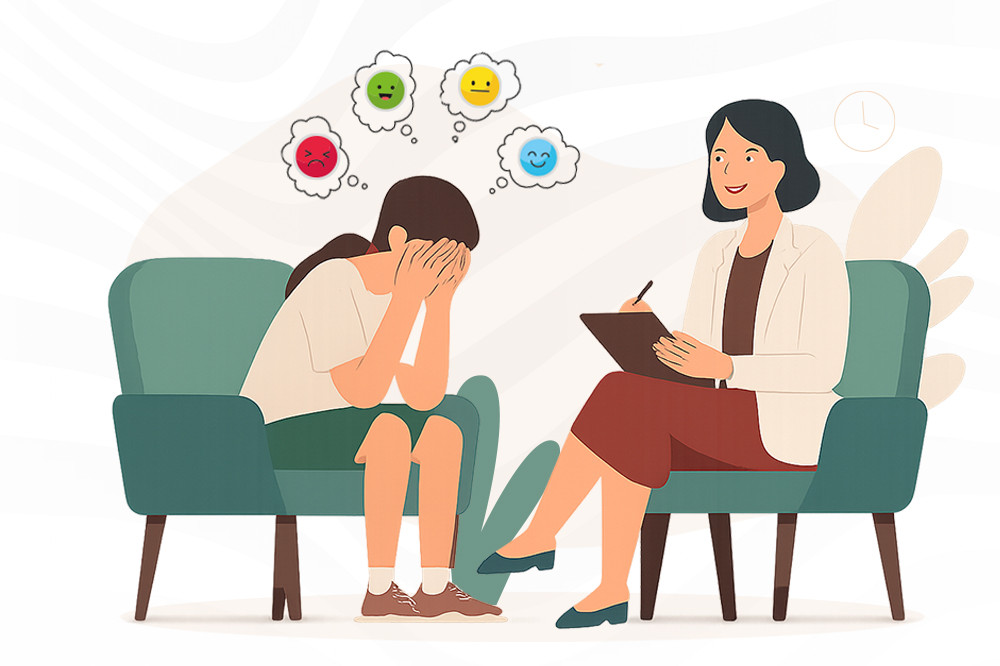
Success in a student’s life is not defined by marks alone. Discipline, healthy habits, and emotional balance are equally important in shaping both academic performance and personal growth. However, many students struggle with procrastination, lack of motivation, or challenges in managing relationships — issues that can hold back their true potential. For parents, it can be frustrating and stressful to watch their children underperform despite having the ability to excel.
This is where Career Map’s Behavioural & Psychological Counselling becomes essential — helping students make better choices, achieve emotional stability, and follow healthier patterns of growth.
What Is Behavioural Counselling?
Behavioural Counselling is a structured process that helps students understand and improve their habits, attitudes, and actions. Unlike general counselling, it specifically focuses on applying Behavioural and Psychological Techniques to create measurable, positive change.
Through this, students are equipped with practical strategies to manage academic pressure, regulate emotions, and strengthen social interactions. Globally, behavioural counselling has been shown to significantly enhance both academic performance and emotional well-being among young learners.
Why Students Develop Behavioural Challenges
Behavioural challenges among students rarely arise in isolation. They are often the result of a mix of external pressures—such as family expectations, academic demands, and peer comparisons—and internal struggles like low self-confidence or lack of direction. While these young learners may be capable and talented, constant stress in their environment can shape how they think, feel, and act. Over time, these influences can disrupt focus, motivation, and emotional balance, giving rise to patterns of behaviour that affect both learning and well-being.
Many students face difficulties not because they lack ability, but due to pressures such as:
These pressures often manifest as behavioural challenges, including:
Recognizing not just the root causes, but also the specific behavioural patterns that emerge, is the first step toward meaningful improvement.
Why Behavioural Counselling Matters for Students
Career Map’s Role in Behavioural and Psychological Counselling
As the No. 1 career counselling organization in Odisha, Career Map believes that mental health is the foundation of career success. That’s why we conduct specialised counselling sessions tailored to students, professionals, and families.
Areas We Cover:
By offering this wide range of services, Career Map ensures individuals don’t just find the right career path — they gain the emotional strength to pursue it with confidence.
How Behavioural Counselling Works at Career Map
At Career Map, counselling follows a structured yet personalized approach:
Students also learn practical, everyday tools such as journaling, breaking tasks into smaller steps, mindfulness exercises, and stress-management practices that deliver immediate benefits.
To Summarize
The real value of counselling lies in its long-term impact. Career Map’s evidence-based approach ensures that students emerge not only stronger in academics but also resilient, emotionally balanced, and future-ready — outcomes that give parents lasting peace of mind.
Benefits of Behavioural Counselling
How Career Map Supports You and Your Child
The Bigger Picture
Behavioural and Psychological Counselling is not just about solving short-term problems. It is about transformation — helping individuals rebuild confidence, manage stress effectively, and make stronger decisions.
At Career Map, the most trusted counselling provider in Odisha, our mission is to empower every individual with the emotional strength and clarity needed for a fulfilling future.
Don’t let stress, anxiety, or self-doubt define your journey. Take the first step towards emotional well-being and career success with Career Map today.
BOOK A SESSION NOW!
Frequently Asked Questions (FAQs)
1. How is behavioural counselling different from general counselling?
Behavioural counselling focuses on changing habits, thought patterns, and behaviours that affect academics and daily life, using structured techniques. General counselling is broader and may not always address specific behavioural changes.
2. At what age should students start behavioural counselling?
It can benefit students of any age but is most impactful during class 9th to 12th, when habits and aspirations are being shaped.
3. How do parents know if their child needs counselling?
Warning signs include chronic procrastination, exam anxiety, poor focus, withdrawal from peers, or persistent self-doubt.
4. Does counselling mean my child has a serious problem?
Not at all. Counselling is a preventive and supportive step that helps students develop resilience, focus, and healthy coping strategies.
5. How long does it take to see results after a counselling session?
Positive changes are often noticed within a few weeks of consistent sessions. Long-term growth depends on the individual’s needs and commitment.
6. Can behavioural counselling be done online?
Yes. Career Map offers both in-person and online sessions, making support accessible from anywhere.
7. What if my child resists counselling?
This is common initially. Our counsellors use student-friendly approaches to build trust and gradually engage them in the process.
8. How does Career Map’s counselling stand out?
Career Map uniquely combines behavioural and psychological counselling with career guidance — ensuring students not only overcome emotional and academic challenges but also move forward with a clear vision for their future.
Hello !!
I'm a Career Bee
